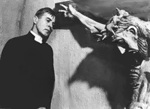The order of mass is methodically performed before a dwindling congregation: a school teacher, Marta (Ingrid Thulin), a troubled parishioner, Jonas Persson (Max von Sydow) and Jonas’ wife, Karin (Gunnel Lindblom). But the ritual no longer holds any significance for its messenger, pastor Tomas (Gunnar Bjornstrand), who has a crisis of faith. Note several framed shots of a fevered, anguished Tomas juxtaposed against a sculpture of the Crucifixion. Distant and cruel to the woman who loves him (symbolically, Marta’s skin condition is a literal rejection of the flesh), he is passionless and mechanical. When an angst ridden, suicidal Jonas seeks guidance on a perceived imminent nuclear holocaust, doubting Tomas can only offer his own uncertainty, and cannot save him.
Perhaps the most spiritually bleak and visually stark of Ingmar Bergman’s religious chamber series, Winter Light, the second film of the trilogy, is a transitional film, both thematically and conceptually. It marks Bergman’s final exploration of religious faith, and serves as a prelude to the human relational drama of his subsequent work. Similar to Through a Glass Darkly, minimal cast, dialogue, and scenery pervade the film, distilling the atmosphere, and story, to its fundamental essence: God’s silence. The use of monologues, prolonged silences, and extreme close-ups convey character introspection and emotional isolation. Furthermore, the barren landscape, seasonal climate, and Tomas’ illness serve to further reflect the cold emptiness of his soul. In the end, Tomas returns to the sanctity of the ceremonial mass – the one constant in his life – ministering the hollow words for those who seek comfort behind their meaning, deriving from them a reflection of their own spirituality and emotional equilibrium: an echo god.
© Acquarello 1999. All rights reserved.
